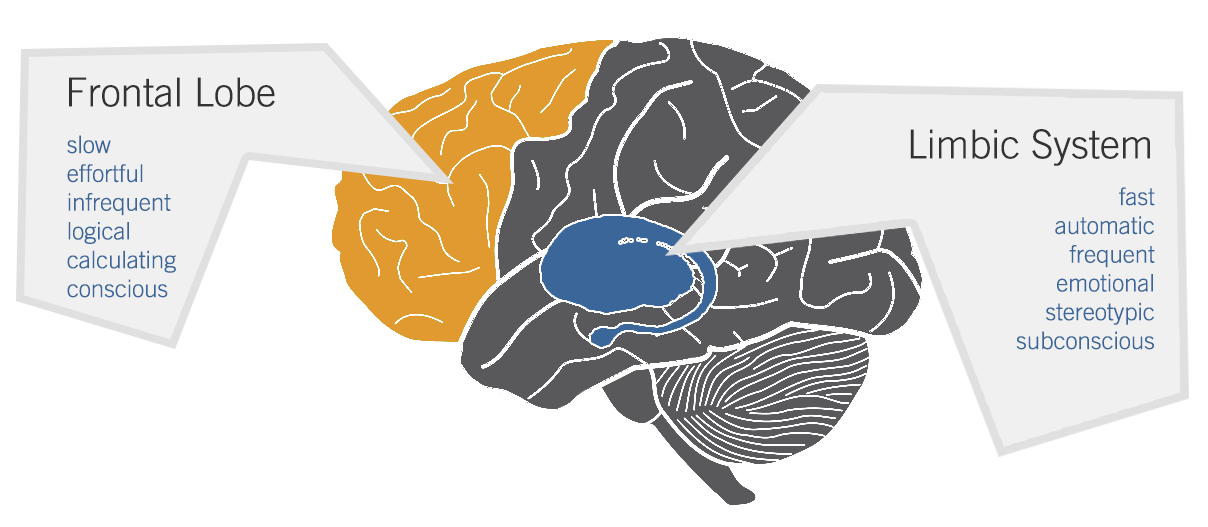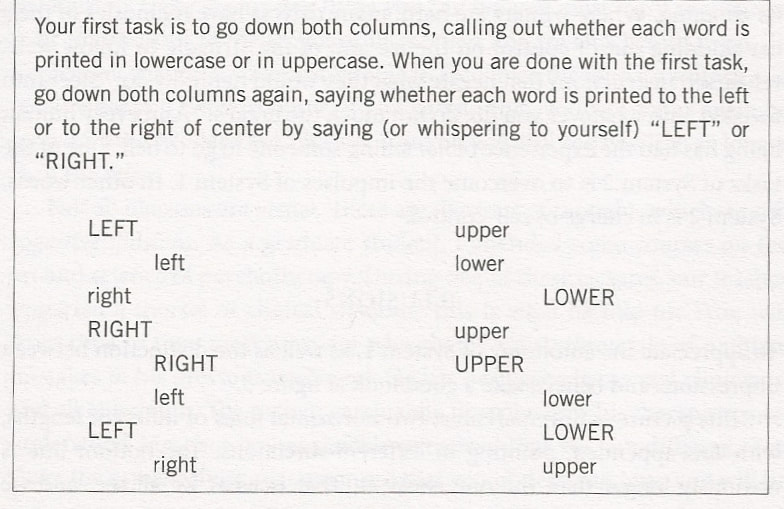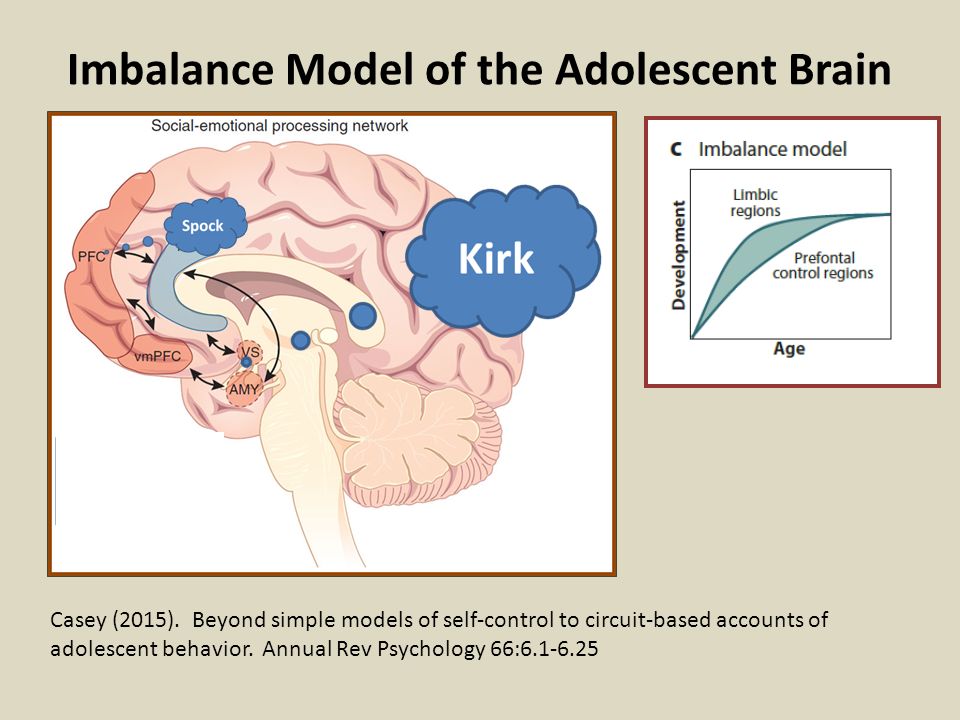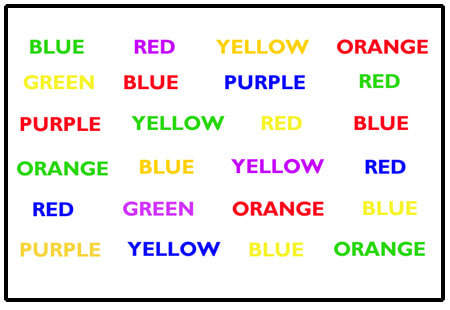Lesson 1 - Thinking fast and slow
Le cœur a ses raisons que la raison ne connaît - The heart has its reasons which reason knows not Blaise Pascal
This lesson is dedicated to how we think and how this is related to what it means to know. Much of what we will do in this lesson will be revisited in later lessons, so although important, it is not too serious if you don't understand it first time around.
The basic idea is that your brain has two minds, or systems of thought: System 1 and System 2
The basic idea is that your brain has two minds, or systems of thought: System 1 and System 2
|
System 1 is associated with fast thinking. It is automatic, always on and works with very little effort. Think back to the activity you did at the start of the lesson, the sort of knowledge described was mainly System 1. They included things that you learnt through repetitive practice, through social experience or from instinct are all typical of System 1. In evolutionary terms this is the oldest part of the brain, the part of the brain that has most in common with other animal species. It is System 1 that lets you know that 2+2 = 4, that Paris is the capital of France and the missing word in this phrase 'fish and _____'. You know the answers instantly and with no effort. System 1 is the powerhouse of your brain, it controls most of what you think and do but because you don't notice it, System 1 rarely gets any of the credit.
|
|
System 2 is associated with deliberate and slow thinking. When we think of who we are or what it means to be a rational decision making human, we are referring to System 2. When a teacher says to you 'pay attention' or tells you to 'concentrate' she is asking you to deliberately engage System 2. This is not easy, because compared to System 1, System 2 is fairly weak. You have a limited short term memory and a limited ability to hold complex ideas in your head at the same time. That is why you can feel exhausted when you come out of particularly taxing maths lesson and why you might be struggling to understand these new psychological concepts written in your second language. One of the problems of System 2 is that when it does get overloaded it can allow System 1 to take over. As we will see, this can sometimes lead to trouble.
|
Ten important qualities of the two systems
System 1 |
System 2 |
Unconscious reasoning (Intuition, Creativity, Subconscious) |
Conscious reasoning (Deliberative reasoning) |
Mostly involuntary |
Mostly voluntary |
Mostly linked to emotions ("gut feeling") |
Mostly detached from emotions |
Low Effort |
High Effort |
Rapid |
Slow |
Large Capacity |
Small Capacity |
Insightful (Aha moments), Radical, Novel |
Methodical, Incremental, Repetitive |
Intuitive, Creative |
Logical, Rational |
Daydreaming, Mind wandering |
Working, Paying attention |
Evolutionarily old |
Evolutionarily recent |
In the lesson we'll be looking at what happens when we deliberately cause the two systems to clash with each other. I'll be adding lots of additional examples and videos after all the classes have been taught. If you are interested in knowing more, check back in a couple of weeks or so. In the meantime, have a go at the following activity produced by the psychologist Daniel Kahneman, the man who wrote the book 'Thinking, Fast and Slow'. The image on the right explains why adolescents have greater difficulty controlling their emotions and impulses (and also why they need more sleep!). It's not your fault, your brain hasn't caught up to the rest of your body yet.
Further reading and resources...
Daniel Kahneman
The long video below is a lecture by Daniel Kahneman that he gave at the time of the release of his best selling book 'Thinking, Fast and Slow'. You will see him use many of the ideas I borrowed for my lesson with you. The shorter video tries to summarise the book and it does quite a good job. It includes a lot of key ideas that our short lesson didn't have time for.
The Guardian Newspaper provided a useful review of Daniel Kahneman's book when it came out, it summarises the main ideas.
This New York Times account is slightly more critical but still very positive.
The long video below is a lecture by Daniel Kahneman that he gave at the time of the release of his best selling book 'Thinking, Fast and Slow'. You will see him use many of the ideas I borrowed for my lesson with you. The shorter video tries to summarise the book and it does quite a good job. It includes a lot of key ideas that our short lesson didn't have time for.
The Guardian Newspaper provided a useful review of Daniel Kahneman's book when it came out, it summarises the main ideas.
This New York Times account is slightly more critical but still very positive.
|
|
|
Christopher Chabris and Daniel Simons
These are the psychologists/neuroscientists responsible for the invisible gorilla experiment http://www.theinvisiblegorilla.com. The website contains a number of interesting videos that demonstrate other experiments they have conducted.
These are the psychologists/neuroscientists responsible for the invisible gorilla experiment http://www.theinvisiblegorilla.com. The website contains a number of interesting videos that demonstrate other experiments they have conducted.
|
|
|
National Geographic Brain Games on attention
|
|
|
|
The Stroop effect
In psychology, the Stroop effect is the delay in reaction time between congruent and incongruent stimuli. A basic task that demonstrates this effect occurs when there is a mismatch between the name of a colour (e.g., "blue", "green", or "red") and the colour it is printed on (i.e., the word "red" printed in blue ink instead of red ink). When asked to name the colour of the word it takes longer and is more prone to errors when the colour of the ink does not match the name of the colour. The effect is named after John Ridley Stroop, who first published the effect in English in 1935. You can test yourself here: www.psytoolkit.org/lessons/stroop.html |
The Marshmallow Test and Executive Functions
|
|
Executive functions are a set of skills that include organisation, attention, and planning. They are associated with what Daniel Kahneman calls system 2.
Executive functioning skills develop over time and peak when we are in our mid-20s. The Marshmallow Test evaluates a child’s ability to delay gratification and measures the three main aspects of executive function (working memory, flexible thinking, and inhibitory control). The test is pretty simple. Children are given a choice between a smaller reward right away or a larger reward later. In this video, we watch as preschoolers are given the Marshmallow Test. |
Other interesting experiments in fast and slow thinking.
|
|
|
|






